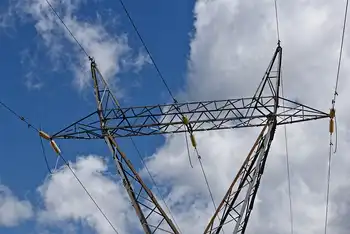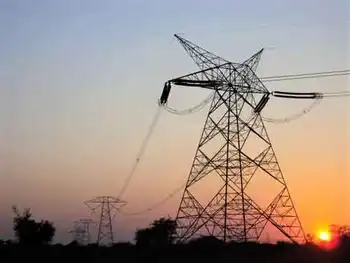Power bills: How much will they rise?
By Richmond Times-Dispatch
NFPA 70e Training - Arc Flash
Our customized live online or in‑person group training can be delivered to your staff at your location.

- Live Online
- 6 hours Instructor-led
- Group Training Available
Rates will rise, though. Rate caps, which were going to end under deregulation, could end years sooner when the state re-regulates electricity supply, probably this year. Caps were put on utility rates to protect consumers from volatile rates until competition developed.
Re-regulation proposals, sponsored by Sen. Thomas K. Norment Jr., R-James City, and Del. Clarke N. Hogan, R-Halifax, have passed in the Virginia Senate and House of Delegates.
Some believe legislators have chosen a path, charted by Dominion Virginia Power, that benefits utilities more than consumers.
Dominion Virginia Power says its plan would raise rates no more than inflation. Utilities need to earn higher profit to encourage investment in power plants required to accommodate growth, the company says.
Consumer groups say the legislation would produce higher electric bills than returning to traditional rate regulation, which a few lawmakers have proposed. Environmentalists say demand could be curbed by conservation and efficient energy use.
Under traditional regulation, the State Corporation Commission looked at all of a utility's costs, expenses and revenues and set rates that would allow a fair profit. Under Dominion Virginia Power's proposal, rates would be set by a formula included in the law and by rate add-ons and incentives also included in the law.
Louis Monacell, a lawyer for some of Virginia's largest industrial and commercial electricity consumers, says predicting the cost to consumers of Dominion Virginia Power's plan requires assumptions about the future.
"However, we are confident the legislation would cost customers billions of dollars in higher rates, more than $10 billion over the next 15 years than would otherwise be the case," Monacell said. Customers would see 10 percent higher bills on average because of limits placed on state regulators, he said.
One of the greatest problems with the legislation may be the incentive it gives utilities to overbuild power plants, Monacell said. The legislation would greatly reduce regulators' ability to determine the reasonableness of utility investments, he said.
Paul Hilton, Dominion Virginia Power's senior vice president of state regulation, said the utility's large number of customers allow it to pursue a building program without much change in rates.
Plans now to build a new coal-burning plant in Southwest Virginia and new nuclear unit at its North Anna Power Station at a total cost of about $4 billion would probably result in a rate increase of no more than 1 to 2 percentage points, he said.
With the exception of the $1 billion coal plant, whose construction is mandated by the General Assembly, the State Corporation Commission would have to approve whatever the company wants to build, Hilton said. "We can't build just because we want to."
Despite differences over how to re-regulate, there is widespread agreement that Virginia should abandon its decade-old deregulation experiment. Otherwise, because competition has failed to develop, Virginians would face monopoly electricity suppliers when rate caps end.
The re-regulation legislation being considered would not stop an approximate 10 percent rate increase Dominion's residential customers could see in July. It is then, under current law, that the utility - which serves two-thirds of the state's land area and 80 percent of its population - gets to raise the portion of its rates that cover power-plant fuel costs for the first time in three years.
Dominion's rates were $525 million short of covering its fuel bill for the 12 months ending Nov. 30, according to state regulators. If that shortfall is projected to hold, average residential customers, using 1,200 kilowatt-hours of electricity per month, would see $10 added to their monthly bills to help fill the revenue gap.
Hilton said once the fuel shortfall, whatever it is, is recovered, predictions are that fuel prices should remain stable for several years.
Some critics of Dominion's re-regulation legislation, including some of the state's largest industrial companies, say the increase in the fuel rate should be offset by cutting the utility's base rates.
Under deregulation, utilities have been allowed to earn more than normal to compensate for expected losses to competitors. Various estimates put the extra earnings at between $850 million and $1 billion.
Excessive earnings, or any earnings over the last allowed rate of return set by regulators, need to be eliminated before any re- regulation plan is adopted, consumers argue.
The proposed legislation would not allow Dominion Virginia Power's rates to be reduced until 2012, but 60 percent of excess earnings which could grow because of provisions in the bill -- would be rebated in the meantime to consumers.
Hilton said Dominion Virginia Power has used the excess earnings since deregulation to buy out expensive power-purchase contracts, offset higher fuel costs it was unable to pass on to consumers and cover losses on assets that were left over from the last regulation.
Critics have argued that re-regulation is a complex undertaking that should not be rushed by the assembly, particularly in this year's short session. Dominion Virginia Power and its backers in the legislature are determined, however, to have a re-regulation law this year.
When the state started to deregulate electricity generation over a decade ago, Virginia had some of the lowest electric rates in the nation, Del. H. Morgan Griffith, R-Salem, said during this year's re- regulation debate. "I don't want to have the highest rates when we finish."











